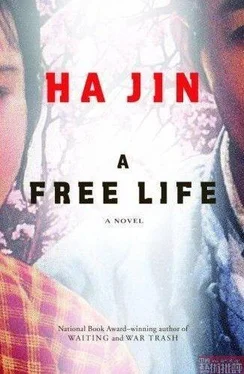Shaoya received Nan and Danning warmly and brewed a pot of Puer tea for them. Wearing a puce tunic, she looked slightly older than she had eight years ago, but her face was sunny, as if she enjoyed living alone. She had a favor to ask Nan. Her husband's dying wish was to have his ashes taken to Canada, where their daughter was studying chemistry at the University of Alberta. Shaoya wanted Nan to help realize Mr. Liu's wish-once he took the ashes to the United States, he could mail them to their daughter from there.
The request surprised Nan and evoked mixed feelings in him. Mr. Liu had been a fervent patriot, but why would he want to have his cremains shipped out of their native land? Had he changed his mind about China? Didn't he love this country anymore? He must have been bitterly disillusioned. Nan 's mind was spinning with questions, yet he said to Shaoya, "I can take his ashes with me, but I can't guarantee you that they'll reach your daughter."
" China 's customs may confiscate them," added Danning.
She said, "I've thought about the risk too, but I can't mail them from here. Our mail is monitored."
"How about letting me take half his ashes?" Nan suggested. "Just in case the customs seize them."
"That's what my husband desired-he wanted a part of him to remain in China. I packed only half the cremains."
She got up and went into an inner room. Nan sighed and sipped the hot tea, which tasted a little grassy. Danning whispered to him, "Mr. Liu used to say he wanted to be buried in a clean place."
"Do you think he missed North America?"
"Probably. He once said he wanted to 'uncage' his soul."
Shaoya returned with a package the size of a brick, tightly wrapped with blue plastic cloth, a small envelope taped to its top containing a letter for her daughter, and she placed the parcel on the tea table. Nan lifted it with both hands. It was light, less than a pound. Carefully he put it into his shoulder bag.
They went on talking about some common acquaintances living in New York City. Shaoya said she wished she could have lived in America three more years so that she could have earned enough points to qualify for U.S. Social Security, but she'd had to return with her dying husband the year before. Now she depended on the remittances her daughter sent from Canada, because her salary was just enough for food and rent. She planned to leave China, but it looked as though she might not be able to do that in the near future. The police had kept her passport and wouldn't return it to her.
Coming out of the Lius', Danning took Nan to a nearby street, saying they should see another person before heading home. Nan followed his friend into a brick building that housed the headquarters of an American fast food company named Cheers. They went up in an elevator to the third floor and found the accounting department. In a stentorian voice Danning greeted the secretary, a young woman wearing eyeliner so thick that it appeared as if her lids had grown into multiple folds. He told her, "I want to see your boss."
"She's on the phone."
"Tell her an old friend is here to see her."
"All right." She turned away as if eager to interrupt her boss.
Suddenly the silver cell phone on her belt chimed and she switched it off.
"Heavens, that sounded like a fire alarm and scared a sweat out of me," said Danning.
Tittering, she nodded at him, then went into the office.
To Nan 's astonishment, Yafang Gao came out, smiling and waving at Danning. "Welcome," she said pleasantly in English. She wore wire-rimmed glasses, a beige Peter Pan-collared pantsuit, and open-toe stilettos. Though trimmer than before, she looked aged and had laugh lines. At first she didn't recognize Nan, but then her face lit up and she held out her hand. " Nan Wu! When did you come back?"
"A few days ago."
" Are you going to work in Beijing?"
"No, I'm leaving for the States tomorrow morning." As he spoke, he saw a shadow cross her face. She kept fluttering her eyelashes.
She took them into her office. Walking behind her, Nan noticed that one of her high heels was shorter than the other one. The moment they sat down on the sectional leatherette sofas, the secretary came in with a tray holding three cups of coffee. Yafang was the director of the accounting department here, and her company had a number of fast food chains in China. As she lifted her cup with her left hand, Nan saw a diamond ring on her finger and remembered she was a lefty. Obviously she was engaged or married, but he wasn't sure if he should ask her about that. They talked about life in Beijing and about those who had returned from abroad. Many of them had made a fortune, owning houses, cars, and even companies, but the pressure was tremendous as a result of cutthroat competition in the business world. Nan didn't say much about his life in Georgia and just told her that he still ran his tiny restaurant and still tried to write poetry, but in English now. He expected she'd comment on his persistency in writing, but she didn't respond to that. He felt a little mortified and believed that to her he must be a poor man and probably a failure.
Although she invited them to lunch at a nearby Korean restaurant, Nan declined, saying he had to go shopping for his family in the afternoon. She didn't insist and rose to see them leave. In the hallway, Danning went into the men's room, leaving Nan alone with Yafang. She stepped closer and whispered to him, "I was a silly girl when I went to America seven years ago. I'll appreciate it if you don't talk to others about what happened to me."
"I'm not a chatterbox. My lips are sealed." Indeed, Nan had never mentioned Heng Chen's assaulting her to anyone except for Pingping.
"I've tried so hard to forget that nightmare, but I can't. It still hurts."
"Think of it this way: Heng Chen has got what he deserves and is totally ruined. You're doing so well now-that's the best revenge."
She smiled, this time gratefully. "I know you're a gentleman, Nan. Sometimes I miss New York, but this is home."
"I wish I could say that." His throat contracted, his voice a bit shaky.
She looked him in the face, her eyes radiating a tender light. She said, "You must have a happy family. Few men who come back from America are as calm as you."
"I'm lucky that my wife prefers a solitary life."
Danning appeared down the hall, coming up to them. Yafang hugged Nan and said, "Take care. Good luck with your writing."
"My, that's really close," Danning said to her. "You always just shake my hand."
Before she could respond, the elevator jingled and opened, and they both stepped into it. On their way out, Danning told Nan that Yafang's husband was a senior official in the Trade Ministry, a man about town who had earned a Ph.D. from the London School of Economics. The husband and wife were popular and influential figures in the business circle in Beijing, also notable for their private foundation that funded several elementary schools in the countryside. Danning had known them for just about a year. In fact Yafang had said a lot of good things about Nan.
NAN returned to Atlanta bone tired and with a stomachache. Ping-ping massaged his back to help him get the gas out, but she couldn't stop his fits of hiccups. As she was working on him, she asked, "What did you eat that gave you so much gas?"
"Nothing indigestible. I was just disappointed."
He told her how his mother wanted to come to work for them and how Uncle Zhao still set his sights on holding a one-man show in America. The whole trip had been mostly torture, and he should have listened to Pingping, who had warned him not to go. He had just wasted time and money. "I felt out of place wherever I went in China," he told her. "Trash, trash everywhere, so many places were like a garbage dump. I had an awful time, awful."
Читать дальше












